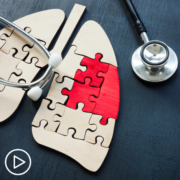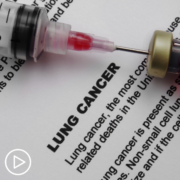Lung Cancer Strategies for Veterans: Research and Care Insights
Lung Cancer Strategies for Veterans: Research and Care Insights from Patient Empowerment Network on Vimeo.
What’s important for veterans with lung cancer and care partners to know about research and care? Expert Dr. Drew Moghanaki from UCLA Health discusses research initiatives, screening recommendations, and patient advice for proactive care.
[ACT]IVATION TIP
“…if you’ve got a cough that won’t go away, push hard to say, ‘Look, I really just want to take a look inside my chest.’ It won’t be a low-dose screening chest CT. It’ll be a regular chest CT. And that CT, even if normal, can be a nice baseline for future scans in the future if more scans are needed.”
Download Resource Guide | Descargar guía de recursos
See More from [ACT]IVATED NSCLC Veterans
Related Resources:
Transcript:
Lisa Hatfield:
Dr. Moghanaki, can you speak to your research around strategic initiatives for veterans facing lung cancer? And what should your patients, their care partners be asking as they seek care?
Dr. Drew Moghanaki:
I really care about driving down the symptoms and the burden of lung cancer, and there’s a lot of great treatments out there that are safer and more effective than ever before. Our patients are living better lives and longer lives, and I really focus a lot on that type of research. But one of the things that really probably has the biggest benefit is just earlier detection. And early detection takes place by having an annual chest CT scan with a certain type of CT scan that’s a lower dose of radiation that the scan requires. And we don’t scan people who have symptoms.
So I’m talking about people who are at risk. And right now, our best measure of who’s at risk for getting lung cancer are people who smoked a lot of cigarettes in their lifetime. And they basically once a year get a scan, and we’re looking for lung cancers at the earliest time that they’re sprouting, and that’s because if we catch it early, we’ve got the safest treatments and the most effective treatments and the highest cure rates, and so my activation tip is if you know anybody or if you yourself are at risk for lung cancer because there’s a lot of smoking going on, please get your lungs screened and talk to your primary care provider to get that lung screening scan ordered.
Lisa Hatfield:
Okay. And just a follow-up question for that, if a person does have some type of symptoms, or if I guess if they’re a smoker also, but they have some type of symptoms and they say, “Oh, I’d like to have this low dose chest CT scan.” Can they just ask their primary care provider about that? Or are they, are PCPs automatically going to screen people who have symptoms or have been long-time smokers?
Dr. Drew Moghanaki:
It’s really a standard of care to get some imaging of the chest. If you’ve got somebody with a cough that won’t go away or some sort of pain inside the chest. In that situation, we don’t get a low-dose chest CT. We get a regular CT to take a look. Now, one of the things is if a patient has smoked a lot, people really start to worry, this might be lung cancer. But one of the things that we’re seeing is there’s a lot of people getting lung cancer who never smoked or they just smoked a little bit. And the doctor may say, “Well, I don’t think you’re going to get lung cancer.” And they don’t get a scan. And that’s actually a problem.
So for those patients, my activation tip is, look, if you’ve got a cough that won’t go away, push hard to say, “Look, I really just want to take a look inside my chest.” It won’t be a low-dose screening chest CT. It’ll be a regular chest CT. And that CT, even if normal, can be a nice baseline for future scans in the future if more scans are needed. It’s always good to have a baseline at an earlier age, so we can see if new things show up, if they’ve been there for a while, or if they really are new.
Share Your Feedback
Create your own user feedback survey













